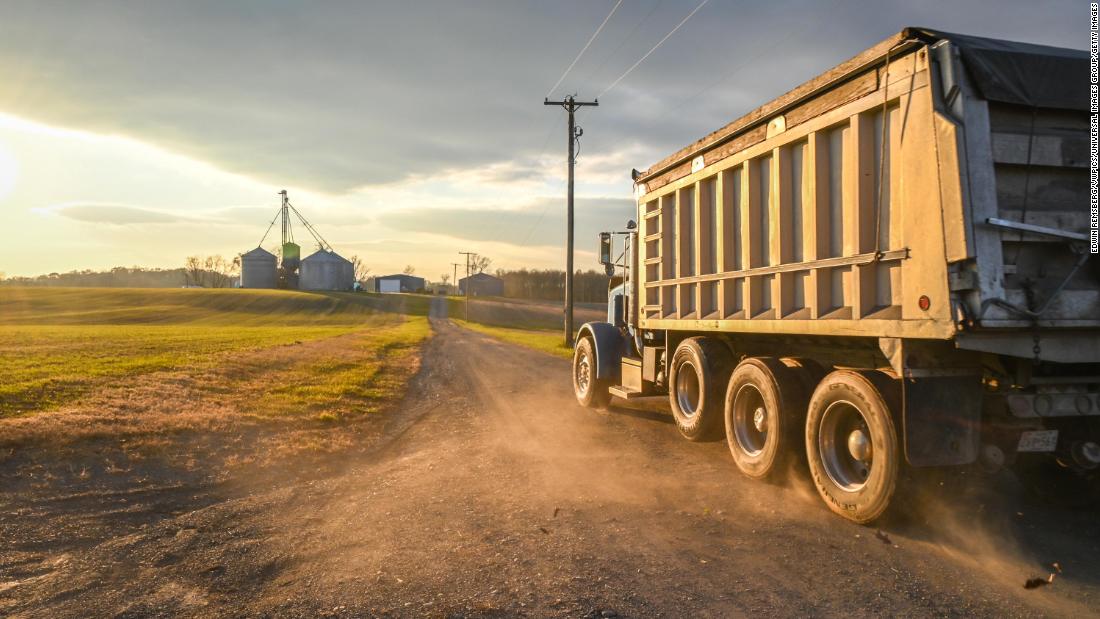
(CNN)Former President Donald Trump sent billions in federal aid in a bid to win over America's farmers -- but now they're all for President Joe Biden's $1.2 trillion infrastructure package, in hopes it will mean fixing roads and bridges critical to the delivery of food to the rest of the nation.
The bill could be a big bipartisan win. It was drafted by lawmakers from both parties and passed the Senate with 19 Republican votes in August, but its fate remains uncertain with Democrats divided over tying it to a larger $3.5 trillion spending package.
"We'll take as much money the federal government can send our way and I would say almost every state is in a similar condition," said Bill Panos, the director of the North Dakota Department of Transportation, who also serves as the president of the Western Association of State Highway Transportation Officials.
Panos has a 10-year plan for North Dakota that is projected to cost $2 billion just to maintain existing infrastructure -- about the amount in federal funding the state expects to receive for road and highway investments if the bill passes. North Dakota's senators Kevin Cramer and John Hoeven, both Republicans, voted for the bill.
"These are the kinds of projects that bring food from the farm to your grocery store," Panos added.
Iowa farmer Dave Walton is a prime example of where the problems are. During the fall harvest, he drives his soybeans east to a terminal on the Mississippi River, where a barge will eventually deliver them down to the Gulf of Mexico. But that first leg of the trip takes Walton a lot more time than it used to.
"We have to detour in several places now because the bridges are in disrepair and the weight limit has lowered," Walton said, adding, "It can be miles and miles out of the way."
Poor infrastructure is causing delays and costing farmers money across the country. Roads are getting worse as farm equipment is getting bigger. The problem is made even worse by extreme weather events and the stresses the pandemic has put on the supply chain, leading to shortages of everything from McDonald's milkshakes to used cars.
Waiting on Congress
Progressive Democrats don't want to vote for the widely popular infrastructure bill without also voting to pass an even bigger $3.5 trillion spending bill that would remake a lot of the country's social safety net system -- and also likely raise taxes on the wealthy and corporations.
Here are the key dates to watch:
- September 27: A self-imposed deadline for the House to vote on a bipartisan infrastructure deal, unlocking a path to the larger spending bill.
- September 30: Government funding expires at midnight, which could trigger a shutdown.
- Mid-October: The government reaches its borrowing limit, which could trigger a first-ever US default and a self-inflicted economic crisis if the US is unable to pay all its bills on time. It could delay federal payments, including Social Security checks and monthly child tax credit payments.
As currently written, the infrastructure legislation would invest $110 billion in roads and bridges, $39 billion in public transportation, $66 in passenger rail, $17 billion in port infrastructure and $25 billion in airports -- among several other things. The bigger spending bill focuses more on Biden's social policies, including an expansion of the child tax credit, a paid leave benefit, universal pre-K and free community college.
And one proposal that angered farmers has been dropped from the House version of the bill following criticism from many farm trade groups. It would have taxed unrealized capital gains to help pay for the bill, affecting those who want to pass down their farm to the next generation -- though the White House said it would exclude family farmers.
Johnathan Hladik, the policy director at the Center for Rural Affairs, argues that Congress should fix the basic, traditional infrastructure before tackling other issues.
"First things first, let's just fix the basic problems. We have to travel long distances here just to live our daily lives," Hladik said.
Waterway delays cost $44 million a year
The Mississippi River provides a cost-efficient and environment-friendly way to move and export farm produce and manufactured goods -- but many of the locks are older than the 50 years they were designed to last. While improvements have been made recently, delays still cost $44 million a year, according to the US Department of Agriculture.
A lock closure could cause a major problem, backing up barges with no other way to go until it's fixed.
"The locks are showing their age. The real big worry is having a failure at one of these sites during harvest season," said Mike Steenhoek, the executive director of the Soy Transportation Coalition.
The infrastructure bill would provide the much needed funding to improve the inland waterway system, as well as to expand the nation's broadband system -- a potential boon for people living in rural America. There's hope that improving infrastructure can revive rural communities, which have been losing population over time.
"In order to retain population and grow you're going to need infrastructure," said former North Dakota Sen. Heidi Heitkamp, a Democrat, who currently serves as director of agriculture for the tax consulting firm alliantgroup. "You're not gonna live somewhere you can't stream Netflix."
"now" - Google News
September 26, 2021 at 07:00PM
https://ift.tt/3EVa99O
Trump went all-out to win farmer support. Now they're all in on Biden's infrastructure plan - CNN
"now" - Google News
https://ift.tt/35sfxPY
Bagikan Berita Ini














0 Response to "Trump went all-out to win farmer support. Now they're all in on Biden's infrastructure plan - CNN"
Post a Comment